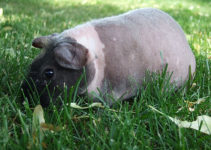Know How Much Calcium Is In Your Guinea Pigs Diet
Calcium is an important nutrient for growth and proper health in Skinny Pigs. However, you need to be careful because excess calcium can have negative consequences. Young Skinny Pigs that are less than 6 months old require more calcium for proper bone growth. Try to feed your Skinny pig vegetables that are higher in calcium. Alfalfa based pellets are a great way to make sure your young Skinny is getting enough Calcium. Skinny Pigs older than 6 months you need to take caution with how much calcium is in their diet. It is at this age that excessive calcium can cause health issues.
How Is Calcium Processed?
A guinea pig will use whatever calcium they need up and the extra gets passed out through their urine. You can get an idea of how much calcium is being passed by your skinny pig. If you use fleece bedding, it can be possible to see white deposits left behind. Some deposits are OK, but if you are seeing too many that can be an indication they are getting too much calcium in their diet. Hard or gritty deposits are a sign you need to make changes to their diet.
What Happens When A Skinny Pig Gets Too Much Calcium?
When a Skinny pig regularly is being fed too much calcium, the bladder will have a hard time flushing it all out properly. If the bladder isn’t flushing out all of the extra calcium, it starts to stay inside the bladder creating sludge.
When conditions are right, this sludge can start to form stones.
Bladder stones in a guinea pigs bladder can turn fatal quickly and require Vet care right away.
How Do I Know If My Skinny Pig Has Bladder Stones?
Signs of bladder stones are:
– Pain when peeing or pooping
– Weight loss
– Not being able to stand or lay down comfortably
– Refusing to walk or eat
– Sitting hunched or fur puffed out
– Blood in the urine
– Large gritty residue left behind after peeing
What Do I Do If My Skinny Pig Has These Signs?
You should take your Skinny Pig to your Vet ASAP! The only way to know for sure that your Skinny Pig has stones is to get an X-Ray or Ultrasound performed. Feeling the abdomen is not always the best way to detect stones. Make sure to ask for an X-Ray
What Can Be Done For A Guinea Pig With Stones?
It is rare for guinea pigs to be able to pass a stone on their own. Some females have been able to pass small stones but in males this is nearly impossibly because of their small urethra. Stones can cause blockages and severe pain.
A guinea pig cannot live with stones in their bladder, the only option is surgery.
Bladder stone surgery can be expensive and is invasive, but there is no other way to get rid of a bladder stone once it has formed. Make sure you pick a vet that is exotic, specializing in guinea pigs and has done these surgeries before.
How Can I Prevent My Skinny Pig From Getting Bladder Stones?
Not all stones can be prevented, genetics plays a huge role in this but diet does as well. Make sure you know the calcium content of all foods your guinea pig is eating. Check out charts on the vegetables you feed, make sure you’re feeding hay that isn’t alfalfa, read the label on your pellet package (you want .4% of calcium or less) and make sure to offer filtered water (this takes out extra calcium). You can put multiple bottles of water in the cage to promote more drinking, you can give an Oxbow Urinary Tablet a day to help with proper bladder function and you can reduce the amount of pellets in pigs showing signs of calcium issues.

